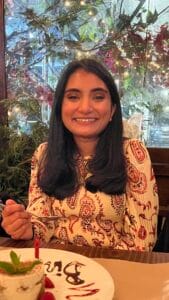Member Insight: Meghana Shamsunder
What sparked your decision to become an epidemiologist?
It really came down to one class in undergrad and my interest in getting an MPH. As a BSPH student at UNC, I was able to take some master’s-level courses at Gillings. One of them was a graduate-level epi course I took as part of my nutrition curriculum—and I loved it. Data analysis felt much more natural to me than working in the lab. I had originally decided on getting an MPH along and a medical degree and decided, focusing in on an MPH in epidemiology and never looked back. Over time, my original goal of becoming a physician shifted toward becoming a PhD-trained epidemiologist where I am about defend my dissertation in November 2025.
What do you see as the biggest obstacle facing epidemiologists in the next five years?
One of the biggest challenges ahead is communicating and practicing good science in a world where trust in scientists has crumbled. As public health professionals, I think can do a better job of meeting the public where they are—listening to their concerns and engaging in real dialogue. Sometimes there’s this expectation that “because it’s science,” people will just accept it. Rebuilding trust means having those tough conversations outside of academia and showing friends, neighbors, and others that we’re listening. Trust takes time to earn but can be lost in a moment.
Do you have any pets?
Not yet—but soon! My husband and I plan to get a golden retriever puppy after I finish my dissertation. It’ll be his first dog (and my second), and he’s already picked out the name: Cal Barkeley, after his alma mater, UC Berkeley.
Why did you join SER? What keeps you coming back?
I joined SER to feel more connected to the broader community of epidemiologists, academia, and public health. The quality of work shared at SER meetings always leaves me feeling inspired and energized. Plus, meeting other early-career professionals who are doing exciting, relevant work keeps me coming back. It’s a great reminder of why I love this field!
What advice do you give students who want to become epidemiologists?
Epidemiology is such a flexible foundation—you can take it in so many directions. Even though public health is going through a tough moment, the skills you learn as an epidemiologist are incredibly transferable. Figure out what excites you most—maybe it’s a specific health topic, or maybe it’s mastering methods in causal inference. Your first job might not have “epidemiologist” in the title, but those skills will serve you well in data science, pharma, government, academia—you name it.
Outside of epidemiology what do you enjoy doing?
I love learning new skills! Lately I’ve been getting back into baking (thank you, Great British Bake Off). I also love creative projects like drawing, painting, and knitting. I find a lot of joy in activities that take focus and a bit of craftsmanship—like reaching that “flow state” where everything else fades away. Whether it’s kneading bread, painting, or tackling a 5,000-piece puzzle, it’s my favorite way to unwind.
What is something that not many people know about you?
Not many people know that I’m a huge sushi lover and have been to different omakase experiences across the U.S. Omakase is like a sushi tasting menu where each piece is handcrafted by the chef for the diner. I love how intimate and immersive it feels—it’s such a peaceful break from the hustle and bustle of everyday life. And if you ever want to try one, I’ve got a list ready!

